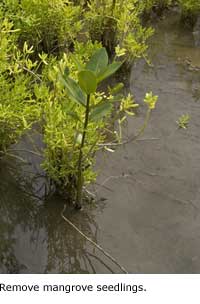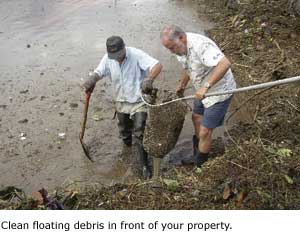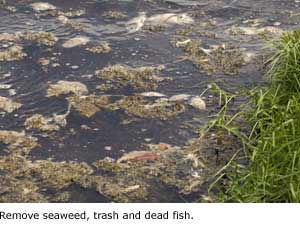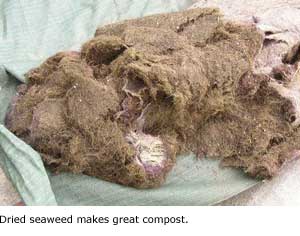 1. Pull mangrove seedlings as soon as you see them.
1. Pull mangrove seedlings as soon as you see them.
2. Don’t let your yard clippings or tree trimmings fall into the lake. Coconuts and palm fronds are a major part of the trash picked up during lake cleanups. Sweep yard waste such as grass clippings, fallen leaves, fruits, and shrub trimmings and keep them out of the storm drain system. Do not blow or hose yard waste into the gutter. Use fallen leaves as mulch or for composting. Place green waste at the curb for recycling collection (see twice/ month schedules at www.opala.org).
3. Don’t empty swimming pool water into the lake. Chemicals in pool water can kill fish. There is also a fine of up to $50,000 for doing this. Pool water should be emptied into the sanitary sewer system (not the street gutters which go into the lake).
4. Periodically remove any algae growing in front of your property. You can dry it and use it as compost or throw it away with the green waste trash.
5. Encourage oysters. Oysters are efficient cleaners of the lake. If they are not a hazard (you probably don’t want them on your boat landing), let them grow.
 6. Keep fertilizer use to a minimum, and don’t use fertilizers if a rainstorm is expected in the next few days.
6. Keep fertilizer use to a minimum, and don’t use fertilizers if a rainstorm is expected in the next few days.
7. Don’t sweep rubbish or street dirt into the storm drains. It ends up in the lake. Do keep sidewalks, curbs, and gutters around your property clean by sweeping up debris and disposing of it in the trash. If you have a yard crew, make sure they know not to blow leaves and trimmings into the street.
8. Report violations. If you see anyone tossing debris or tires into the lake, call the lake security watch, at 366-6479.
9. Control soil erosion on your property. Plant ground cover or mulch bare ground. Schedule grading and excavation projects for dry weather. Cover excavated material and stockpiles of soil, sand, or gravel to protect them from rain, wind, and runoff. Sweep or scoop up cement washout or concrete dust instead of hosing it into driveways, streets, gutters, or storm drains. Do not over-water your yard.
 10. Don’t let your car wash water run into the lake via street gutters. Wash your car on a lawn or gravel drive where the water will soak into the ground. Use a bucket and or nozzle for your hose to keep water from running continuously. Dispose of leftover soapy water in your bucket into a sink. Use detergent sparingly. A rule of thumb is to use no more cleaner than can be rinsed using a 5-gallon bucket of rinse water.
10. Don’t let your car wash water run into the lake via street gutters. Wash your car on a lawn or gravel drive where the water will soak into the ground. Use a bucket and or nozzle for your hose to keep water from running continuously. Dispose of leftover soapy water in your bucket into a sink. Use detergent sparingly. A rule of thumb is to use no more cleaner than can be rinsed using a 5-gallon bucket of rinse water.
11. Pick up your pet waste. Bring a bag, pick it up, and dispose of it properly in the toilet or trash. A single gram of dog feces can contain 23 million fecal coliform bacteria. Pet waste is one of the many little sources of pollution that can add up to a major source of bacteria and excess nutrients that can cause algal blooms (overgrowth of aquatic plants that smother other aquatic life). These blooms use up the oxygen in the water that fish and other organisms need to breathe.
12. Use water-based paint whenever possible. Clean water-based paints in the sink or oil-based paints with thinner. Wrap dried paint residue in newspaper or harden it in its container and dispose of it in the trash. Never clean brushes or rinse paint containers near a storm drain. If you hire painters, make sure they do the same.
13. If you change your own oil, use an oil change box. The best practice is to have your oil changed by a shop that recycles their waste oil. Never use old oil to kill weeds or allow oil to go down a storm drain.
14. Contact city officials and let them know they need to keep sediments out of storm drains that empty into Kaelepulu Pond. Gravel and oil from streets combined with sediment runoff from construction projects deposit about 50 cubic yards of dirt into the lake during a typical heavy rainstorm.
Mayor’s Office
530 S. King Street
Honolulu, HI 96813
Phone: 523-4141
Fax: 527-5552
www1.honolulu.gov/mayor/City Department of Environmental Services
1000 Uluohia Street, Suite 303
Kapolei, HI 96707
Environmental Concern Line: 692-5656
Fax: 692-5520
www.cleanwaterhonolulu.comSpill Response (Hazard Evaluation and Emergency Response)
Local (Honolulu Fire Department): 911 (24/7)
State: 586-4249 (business hours), 247-2191 (after hours)
To report illegal discharge or dumping that has already occurred, call 692-5656
NPDES permitting questions: 692-5207
Polluted runoff public outreach: 692-5208 (City), 586-4309 (State)City Council
Esther Kiaʻāina
District 3, newly elected
Phone: 547-7003
City Council Web
15. Pass this information on to your friends and neighbors.